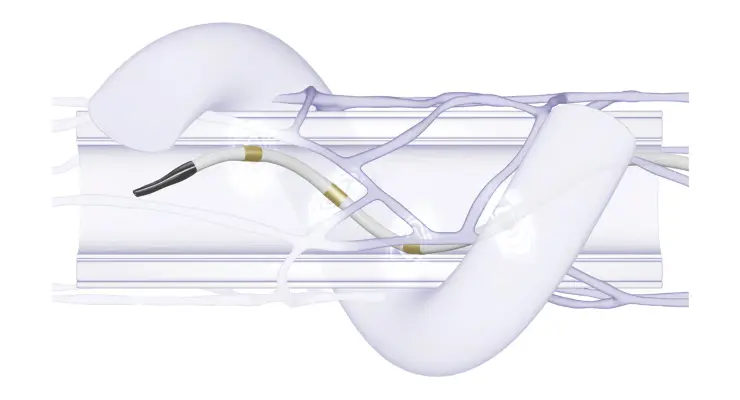St. Luke's is first in region to offer innovative treatment for uncontrolled high blood pressure
December 18, 2024

St. Luke's Bethlehem Campus recently treated the first patient in the Lehigh Valley with a new renal denervation (RDN) procedure designed for individuals with uncontrolled high blood pressure. On December 18, Christopher L. Sarnoski, DO, Chair of Interventional Cardiology, performed the minimally invasive outpatient procedure on a woman whose blood pressure remained abnormally high despite being on multiple antihypertensive medications.
Hypertension is a leading global health concern, contributing to approximately 50% of heart disease and stroke-related deaths, according to the World Heart Federation. In the United States, nearly 50% of adults are affected by hypertension, yet many remain unaware of their condition due to its often-silent symptoms. Although medication and lifestyle modifications are common treatments, approximately 80% of individuals with diagnosed high blood pressure do not achieve adequate control.
The renal denervation procedure, approved by the U.S. Food and Drug Administration (FDA) in November 2023, targets overactive nerves near the kidneys that contribute to high blood pressure. The minimally invasive procedure, which typically takes approximately 2 hours, involves ablating these overactive nerves.
During the procedure, performed under mild sedation, a thin catheter is inserted into the arteries supplying the kidneys. Controlled energy is delivered through the catheter to reduce nerve activity. The catheter is then removed, leaving no implant behind. Most patients are able to return home within a few hours.
Dr. Sarnoski expressed optimism about the procedure's potential to help patients with medication-resistant hypertension, a condition affecting approximately 10-15% of individuals with high blood pressure. “These patients continue to have uncontrolled blood pressure despite taking three or more classes of antihypertensive medications,” Dr. Sarnoski said. Before undergoing renal denervation, patients must be evaluated to rule out secondary causes of hypertension, such as renal artery stenosis, thyroid disorders, obstructive sleep apnea, high levels of renin and aldosterone, or obesity. Additionally, patients should have relatively normal functioning kidneys, Dr. Sarnoski said.
Benefits seen long-term
Patients may not experience an immediate reduction in blood pressure following the procedure, but Dr. Sarnoski noted that improvement is typically seen within three months. “While responders to this novel therapy can be unpredictable regarding the degree of blood pressure reduction, over time blood pressure control tends to slowly improve, offering long-term benefits,” he said.
Renal denervation has been approved in more than 70 countries and is being introduced at select centers in the United States with the expertise and resources to manage these complex cases. St. Luke's Bethlehem Campus is currently the only site in the Lehigh Valley offering this innovative treatment. Dr. Sarnoski looks forward “to expanding access to this groundbreaking technology, providing new hope for patients struggling with medication-resistant hypertension,” he said.
Latest News


April 17, 2025
SLUHN Employee Competes in Boston Marathon on Monday

April 16, 2025